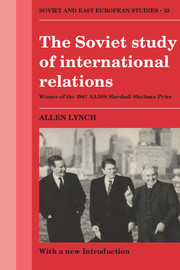Book contents
- Frontmatter
- Contents
- Foreword by Curt Gasteyger
- Acknowledgements
- INTRODUCTION: THE “ NEW POLITICAL THINKING” AND SOVIET FOREIGN POLICY: INTELLECTUAL ORIGINS AND POLITICAL CONSEQUENCES
- INTRODUCTION TO THE FIRST EDITION
- 1 THE BACKGROUND: MARX, LENIN, STALIN AND THE THEORY OF INTERNATIONAL RELATIONS
- 2 THE DEVELOPMENT OF SOVIET POLITICAL STUDIES
- 3 APPROACHES TO INTERNATIONAL RELATIONS
- 4 THE SYSTEMS APPROACH AND INTERNATIONAL RELATIONS
- 5 THE STRUCTURE OF THE INTERNATIONAL SYSTEM: THE SYSTEMS LEVEL
- 6 CRITICAL SUBSYSTEMS
- 7 THE SCIENTIFIC–TECHNICAL REVOLUTION AND THE CHANGING FACE OF INTERNATIONAL RELATIONS
- CONCLUSION
- Notes
- Bibliography
- Index
- SOVIET AND EAST EUROPEAN STUDIES
5 - THE STRUCTURE OF THE INTERNATIONAL SYSTEM: THE SYSTEMS LEVEL
Published online by Cambridge University Press: 05 August 2011
- Frontmatter
- Contents
- Foreword by Curt Gasteyger
- Acknowledgements
- INTRODUCTION: THE “ NEW POLITICAL THINKING” AND SOVIET FOREIGN POLICY: INTELLECTUAL ORIGINS AND POLITICAL CONSEQUENCES
- INTRODUCTION TO THE FIRST EDITION
- 1 THE BACKGROUND: MARX, LENIN, STALIN AND THE THEORY OF INTERNATIONAL RELATIONS
- 2 THE DEVELOPMENT OF SOVIET POLITICAL STUDIES
- 3 APPROACHES TO INTERNATIONAL RELATIONS
- 4 THE SYSTEMS APPROACH AND INTERNATIONAL RELATIONS
- 5 THE STRUCTURE OF THE INTERNATIONAL SYSTEM: THE SYSTEMS LEVEL
- 6 CRITICAL SUBSYSTEMS
- 7 THE SCIENTIFIC–TECHNICAL REVOLUTION AND THE CHANGING FACE OF INTERNATIONAL RELATIONS
- CONCLUSION
- Notes
- Bibliography
- Index
- SOVIET AND EAST EUROPEAN STUDIES
Summary
Although the correlation of forces is constantly changing in favor of socialism, there is still no basis for speaking of its decisive superiority over imperialism.
Georgi ShakhnazarovCRITERIA OF EVALUATION: POWER, CORRELATION OF FORCES, AND THE BALANCE OF POWER
In the preceding two chapters we noted the greatly increased recognition accorded by Soviet theorists of international relations to the concept of system. The “system” of international relations is understood in terms of political relations among sovereign states. Various theorists, among them Kokoshin and Pozdnyakov, have drawn attention to a certain “macrolevel stability” of the international system, whatever the dynamic qualities by which the system maintains itself (such as the evolution of a multipolar system to a bipolar one). Inevitably, the assertion of systemic stability raises an issue which, because of its imputed relation to “bourgeois” efforts to maintain the international status quo, has long been anathema in Soviet analyses of international relations, i.e., the balance of power in world politics.
At the outset, one must distinguish the balance of power as analytical tool and as policy argument in Soviet treatment of the concept. Genrikh Trofimenko, for example, a leading specialist on American politico-military strategy in the Soviet Institute of the USA and Canada, observed in 1976 that “the balance of power (balans sil) is no longer a feasible policy in contemporary conditions.”
- Type
- Chapter
- Information
- The Soviet Study of International Relations , pp. 89 - 107Publisher: Cambridge University PressPrint publication year: 1987

